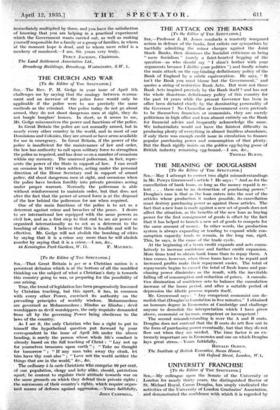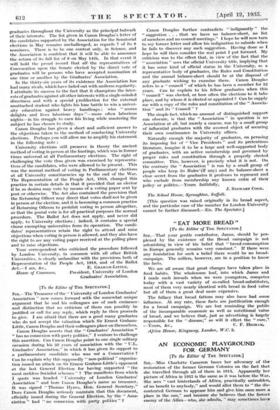UNIVERSITY FRANCHISE
[To the Editor of THE SPECTATOR.] SIII,—My colleague upon the Senate of the University of London for nearly thirty years, the distinguished Rector of St. Michael Royal, Canon Douglas, has amply vindicated the activities of the University of London Graduates' Association, and demonstrated the confidence with which it is regarded by graduates throughout the University as the principal bulwark of their interests. The list given in Canon Douglas's letter of the candidates supported by the Association for the Senatorial elections in May remains unchallenged, as regards 7 of its 8 nominees. There is to be one contest only, in Science, and the Association is confident that it will be able to announce the return of its full list of 8 on May 14th. In that event it will hold the proud record that all- the representatives of Convocation upon the Senate elected by the direct vote of graduates will be persons who have accepted nomination at one time or another by the Graduates' Association.
In the thirty-six years of its existence the Association has had many rivals, which have faded out with uniform regularity. I attribute its success to the fact that it champions the inter- ests of graduates against all other interests with a single-minded directness and with a special predilection for the external unattached student who fights his lone battle to win a univer- sity education against heavy handicaps ; who " scorns delights and lives laborious days "—more often laborious nights—in his struggle to earn his living while mastering the subject he has chosen to study.
Canon Douglas has given a short and sufficient answer to the objections taken to the method of conducting University elections. Perhaps you will allow me to amplify his statement in the following note : University elections still preserve in theory the ancient method of voting in person at the hustings, which was in former times universal at all Parliamentary elections. The right of challenging the vote thus given was exercised by representa- tives of the candidates, who were allowed to be present., This was the normal method of voting in Parliamentary elections at all University constituencies up to the end of the War. The Representation of the People Act, 1918, changed this practice in certain details in that it provided that an elector if he so desires may vote by means of a voting paper sent by post or otherwise. The Act also contained the provision that the Returning Officer may direct that votes shall not be given in person at the election, and it is becoming a common practice of Returning Officers to prohibit voting in person altogether, so that the postal vote is for all practical purposes the normal procedure. The Ballot Act does not apply, and never did apply, to University elections ; indeed, it contains a special clause exempting universities from its operation. The candi- dates' representatives retain the right to attend and raise objections when voting in person is allowed, and they also have the right to see any voting paper received at the polling place and to raise objections.
Your correspondent who criticized the procedure followed by London University, in common with all other British Universities, is clearly unfamiliar with the provisions both of Representation of the People Act, 1918, and of the Ballot
House of Commons. President, University of London
Graduates' Association.



















































 Previous page
Previous page